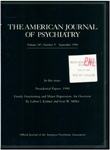Observations of interactions of depressed women with their children
Abstract
Dysfunctional interactions between mothers with major affective disorders and their children may contribute to the children's high risk of disorder. This study investigated the behavior of mothers with recurrent unipolar depression, bipolar disorder, or chronic medical illness and of normal subjects toward their children during a directly observed conflict discussion task. In addition, lifetime history of depression, current mood, and chronic stress were investigated as predictors of maternal interaction. Unipolar depressed women displayed relatively more negative, less positive, and less task-focused behaviour toward their children. Current mood and chronic stress, more than psychiatric history, contributed to the prediction of interaction style.
Access content
To read the fulltext, please use one of the options below to sign in or purchase access.- Personal login
- Institutional Login
- Sign in via OpenAthens
- Register for access
-
Please login/register if you wish to pair your device and check access availability.
Not a subscriber?
PsychiatryOnline subscription options offer access to the DSM-5 library, books, journals, CME, and patient resources. This all-in-one virtual library provides psychiatrists and mental health professionals with key resources for diagnosis, treatment, research, and professional development.
Need more help? PsychiatryOnline Customer Service may be reached by emailing [email protected] or by calling 800-368-5777 (in the U.S.) or 703-907-7322 (outside the U.S.).



